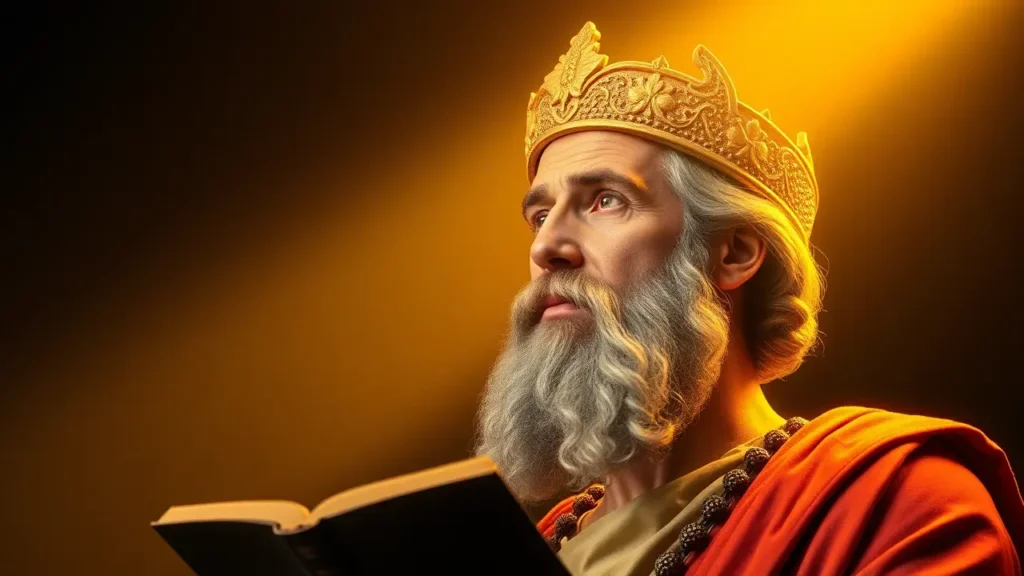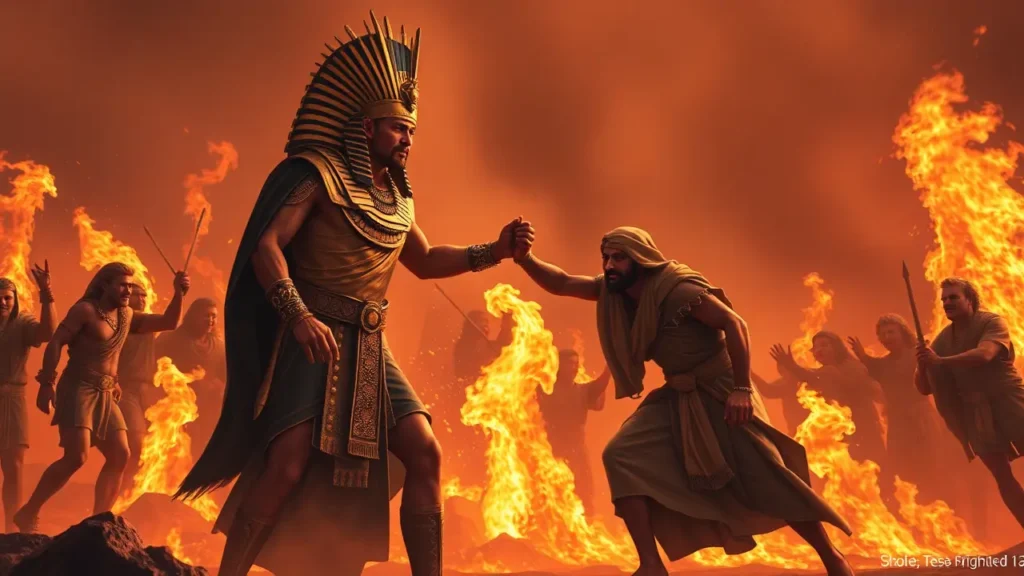Introduction: Who Was Abraham in the Bible?
Whenever we think about faith in the Bible, the name of Abraham always comes to mind. He stands out as one of the most respectful and foundational figures in the Bible. His story begins in the book of Genesis and stretches across the scriptures. Here we’ll discuss about the life of a Great patriarch Abraham in the Bible and father of faith.
He formed the roots of three major religions: Judaism, Christianity, and Islam. But in the Bible, his journey isn’t just historical but it’s deeply spiritual and symbolic.
Brief introduction to Abraham’s place in the Bible
Abraham is first introduced in Genesis as Abram, a man living in a city full of idols and false gods. Yet, even in such a place, God chose him to begin something new and that was a nation that would know the true God.
From this simple man came a great family, and from that family, a great faith. His life was filled with moments of trial, trust, and covenant promises. He wasn’t perfect, but he was faithful, and that’s what set him apart in the eyes of God.
Why he’s called the “Father of Faith”
He’s often called the “Father of Faith”, not because he never doubted, but because he kept moving forward even when things didn’t make sense. Imagine leaving everything behind including your home, relatives, familiar life just because a voice tells you to.
That’s exactly what Abraham did. His trust wasn’t based on logic, but on a relationship with God. This deep and personal faith made him the model for what it means to truly believe.
Overview of his importance in Old and New Testaments
Abraham’s impact isn’t just found in the Old Testament. He’s also mentioned in the New Testament as a symbol of true belief. The apostle Paul refers to Abraham to explain how faith, not works, brings righteousness (Romans 4).
Jesus Himself speaks of Abraham’s joy in seeing His day (John 8:56). His story connects the old and the new, proving that faith has always been the heart of God’s relationship with people.

The Early Life of Patriarch Abraham
Before he became a spiritual hero, Abraham was just an ordinary man named Abram. His beginnings show us that God can call anyone, from anywhere, for a divine purpose.
Abraham’s original name and birthplace in Ur
Abraham was born as Abram in Ur of the Chaldeans, a wealthy and advanced city of its time, located in what is now southern Iraq. Ur was a center of culture, trade, and idol worship.
Living there, Abram likely saw all sorts of religious practices and social norms that were far from the ways of the true God. Yet, in the midst of that environment, God saw something in him, a heart ready to respond.
Family background and cultural environment
Abram came from a family that wasn’t particularly faithful to God. His father Terah was part of a culture deeply involved in worshiping many gods. Life in Ur would have been comfortable and secure, with all the social structures in place.
But sometimes, God calls us away from comfort to grow. Abram’s surroundings shaped his early years, but they didn’t define his future. That was going to change.
God’s call to leave home (Genesis 12)
Then came the turning point. In Genesis 12, God spoke to Abram with a command and a promise: “Go from your country… to the land I will show you.” No map, No full details, Just a call to trust. God promised to make him into a great nation, to bless him and to make his name great.
And most amazingly, “all peoples on earth will be blessed through you.” This was more than just a journey. It was the start of a divine mission that would change history.

God’s Call and Abraham’s Obedience
At that moment, Abraham had a choice: stay in the known or walk into the unknown. What he did next reveals why his story still matters today.
God order to go to a new land
When God spoke to Abram, He didn’t just ask him to relocate but He invited him to trust. The destination wasn’t even revealed yet. That’s not easy for anyone. But God was planting a seed which was a spiritual legacy that would grow through obedience. The promised land wasn’t just a place but it was a promise of something greater. This step required courage and surrender.
Abraham obeys without knowing the full plan
Here’s where Abraham’s faith truly shines. He packed up his family, his servants, and everything he owned and simply went. There was no Google Maps, no social security, no “Plan B.”
He didn’t have all the answers, instead he just had a word from God. This simple but bold step is what makes Abraham’s story so inspiring. He walked by faith, not by sight.
Builds altars and worships God along the journey
As Abraham traveled, he made stops not just for taking rest, but to worship. At key places like Shechem and Bethel, he built altars to the Lord, marking his trust and devotion. These altars were physical symbols of spiritual milestones.
Every time he paused to worship, he was reminding himself and others that this journey was God-led, not self-made. Even when the road was uncertain, Abraham kept connecting with God along the way.
God’s Promise and the Covenant with Abraham
One of the most significant moments in Abraham’s journey was when God made big, life-changing promises to him. These weren’t just casual words but they were sacred, eternal commitments that shaped the future of entire nations.
God’s promises of land, descendants, and blessing
God promised Abraham three key things: a land, countless descendants, and a lasting blessing. At the time, Abraham didn’t have a single child, and he was already growing old. Still, God told him that his offspring would be as many as the stars in the sky.
The land would be theirs, and through his family, “all nations of the earth would be blessed.” These weren’t ordinary promises instead they were filled with divine purpose and destiny.

Covenant ceremony with animal sacrifices
In those days, making a covenant was a serious and symbolic act. In (Genesis 15), God told Abraham to bring animals, cut them in half, and lay the pieces opposite each other. This might sound strange today, but it was a traditional covenant ritual.
Then, something amazing happened when God put Abraham into a deep sleep, and a smoking firepot and a blazing torch passed between the pieces. This meant that God Himself was sealing the covenant, promising to fulfill it even if Abraham failed.
Name changed from Abram to Abraham
Another key sign of this deep relationship was when God changed his name. From “Abram,” which meant “exalted father,” to “Abraham,” meaning “father of many nations.” This was not just a name change, it was an identity shift.
It marked the moment Abraham stepped into his God-given purpose. Now, he wasn’t just hoping for children but he was carrying a promise that would bless generations.
Abraham and Sarah’s Wait for a Child
But even with all those promises, waiting was hard. Years passed, and Abraham and his wife Sarah remained childless. This was not just a test of time, but a test of trust.
Struggles with faith and timing
Abraham and Sarah were human, just like us. They believed God, but the long wait made them question if they had misunderstood. Sometimes they doubted, sometimes they laughed, and sometimes they tried to “help” God by making their own plans. It’s a reminder that even people of great faith can feel weak in the waiting. And still, God was patient with them.

Birth of Ishmael through Hagar
Trying to solve the problem in their own way, Sarah gave her servant Hagar to Abraham, and from that union, Ishmael was born. While this wasn’t part of God’s original plan, God still blessed Ishmael.
But this decision also brought pain and conflict into their family. It teaches us that taking shortcuts in God’s plan may bring results, but not always peace. Still, God’s grace remained with Abraham.
God’s reaffirmation of the promised son
Even after Ishmael was born, God came again to Abraham and reaffirmed the promise: Sarah herself would bear a son. Abraham laughed in amazement, and so did Sarah later but it was true. God said, “Is anything too hard for the Lord?” (Genesis 18:14). That simple question echoed through time, reminding us that God’s timing may test us, but His promises never fail.
The Birth of Isaac
After waiting for what felt like a lifetime, something truly unbelievable happened. Sarah, who had long given up hope of having a child, gave birth to a baby boy. His name was Isaac, and he was nothing less than a miracle.
This wasn’t just the end of a long and painful wait. It was the beginning of a new chapter filled with hope, joy, and deep faith. It showed that when God makes a promise, He never forgets no matter how long it takes.
Miraculous birth in old age
Abraham was 100 years old, and Sarah was about 90 when Isaac was born. By all human understanding, they were far too old to have a child. In fact, even they had laughed at the thought of it years earlier. But God had made a promise, and He kept it exactly as He said He would.
Isaac’s birth was more than a joyful moment for an elderly couple. It was a powerful message that God’s timing is perfect, even when it doesn’t make sense to us. It reminded everyone that nothing is too hard for God.
Celebration of God’s faithfulness
When their son was born, Abraham and Sarah named him Isaac, which means “laughter.” Sarah had once laughed with disbelief when she first heard the promise, but now her laughter was full of pure joy. She said, “God has brought me laughter, and everyone who hears about this will laugh with me” (Genesis 21:6).
This was a time of deep celebration. Not just because of the child, but because it proved that God never breaks His promises. The long wait, the tears, the prayers turned into praise. This moment became a testimony of how faithful and kind God truly is.

Isaac as the start of the promised nation
Isaac’s birth was not only a family miracle. It marked the beginning of a much bigger plan. This one child would one day become the father of Jacob. Jacob would become Israel, the father of twelve tribes. The roots of a nation chosen by God.
From one miracle baby came a whole people meant to carry God’s light and truth into the world. Isaac was living proof that God doesn’t just make promises — He builds generations out of them. What started with a simple act of faith became a legacy that would impact all of history.
The Ultimate Test: Abraham and Isaac
Just when things seemed settled, God asked Abraham to do something that no one could’ve expected. Something that would shake any heart to its core. It was a test unlike any other.
God’s command to sacrifice Isaac
In Genesis 22, God told Abraham, “Take your son, your only son, whom you love — Isaac — and sacrifice him.” These words must have crushed Abraham’s heart. After all these years of waiting, could he now give up the son he loved? It was a command that made no sense, but it came from the God he trusted.
Abraham’s unquestioning obedience
Without hesitation, Abraham obeyed. Early the next morning, he set out with Isaac and the wood for the offering. He didn’t argue, didn’t delay. This was faith in its rawest form obedience without understanding.
He believed, somehow, that God would provide or even raise Isaac from the dead if needed (Hebrews 11:19). That’s the kind of faith that moves mountains.
God provides a ram and reaffirms His covenant
At the last moment, as Abraham raised the knife, God called out and stopped him. Nearby, a ram was caught in the bushes. God had indeed provided. This place was called Jehovah-Jireh, meaning “The Lord will provide.”
And in that sacred moment, God reaffirmed His covenant, saying, “Because you have not withheld your son… I will bless you, and your descendants will be as numerous as the stars.” (Genesis 22:16–17). This test became a turning point one that showed just how deep Abraham’s faith really went.

Abraham’s Continued Walk of Faith
Even after the big tests and fulfilled promises, Abraham’s journey of faith didn’t end. He continued to walk closely with God, managing life’s practical matters while holding on to divine trust.
Life in Canaan, relationships with neighbors
After settling in Canaan, Abraham lived among various tribes and nations. He wasn’t isolated; he had to navigate life among strangers, which wasn’t always easy. Yet, he remained peaceful and respectful. Whether dealing with land disputes or forming treaties, Abraham showed wisdom and grace who was a man who lived with integrity in a foreign land.
Deals with Lot and local kings
His relationship with his nephew Lot also tested his character. When conflicts arose, Abraham gave Lot the better land, showing generosity over greed. Later, when Lot was captured by kings, Abraham bravely gathered his men to rescue him (Genesis 14). He even refused rewards from the King of Sodom, proving that his trust wasn’t in riches but in God.
Consistent worship and trust in God
No matter where Abraham went, one thing remained the same: he built altars and worshipped God. His life was marked by trust, prayer, and obedience. He didn’t just believe in God once but he lived his faith every day, in every decision. That kind of consistent trust is what truly set him apart.
The Death of Sarah and Legacy Through Isaac
Time passed, and with it came loss, the kind of loss that touches the heart deeply. Yet even in sorrow, Abraham acted with hope and purpose, securing the future of his family.
Sarah’s passing and Abraham’s mourning
Sarah, his beloved wife and lifelong companion, passed away at 127 years old (Genesis 23). Abraham mourned deeply for her. This wasn’t just a moment of grief but it was the closing of a major chapter in his life. Still, in his pain, Abraham showed dignity and love.
Purchase of the burial cave at Machpelah
Instead of borrowing land, Abraham bought the Cave of Machpelah from the Hittites which was a powerful statement of faith. He believed that this land would one day belong to his descendants, just as God had promised. That purchase was more than a burial site. It was a quiet act of faith in God’s future plan.
Securing Isaac’s future through marriage to Rebekah
Knowing his time was limited, Abraham made sure to secure Isaac’s future. He sent his servant to find a wife for Isaac, but with clear instructions: she must be from his own people and willing to follow God’s path. The servant’s journey, led by prayer, brought Rebekah into the family. This ensured that the covenant would continue through a faithful line.

The Death of Abraham and His Lasting Legacy
Finally, Abraham’s journey came to a peaceful end. But his story didn’t end with his death. It echoed through generations and continues to shape lives today.
Abraham’s death
Abraham lived a full life of 175 years of walking with God, learning through trials, and growing in faith. Abraham, Sarah and his descendents (Joseph, Jacob, Moses, Isaac, David etc. ) are buried in the cave of Machpelah. When he died, he had seen the birth of the promised son, the marriage of Isaac, and the first fruits of God’s covenant. His life was a testimony of how deeply a person can walk with God.
Burial beside Sarah
He was buried beside Sarah in the Cave of Machpelah, the land he had purchased in faith. Their graves together mark the beginning of a people chosen by God. That burial wasn’t just the end of his life but it was the anchoring of a promise that God would fulfill for centuries to come.
His spiritual and genealogical legacy
Abraham’s influence stretched far beyond his time. Through Isaac, he became the father of the Jewish nation. Through faith, he became a model for Christians. And through Ishmael, he became an ancestor to many Arab peoples, including those of the Islamic tradition. Today, billions of people trace their spiritual heritage back to Abraham who was the friend of God.
Conclusion: Why Is Abraham Called the Father of Faith?
In the end, Abraham’s story isn’t just about blessings, land, or children. It’s about faith which is raw, honest, and unshakable faith. That’s why he’s called the Father of Faith across generations and religions.
His belief was credited as righteousness
When God gave His promises, Abraham believed and that simple belief was counted as righteousness (Genesis 15:6). He didn’t need to earn favor through grand deeds. His faith alone pleased God. That moment became a foundation of grace for believers everywhere.
His faith in God’s promises
Though he waited decades for a child, left everything behind, faced battles and deep trials but still Abraham never gave up on God’s word. His trust didn’t come from having all the answers, but from knowing the One who gives the answers. His journey teaches us that true faith keeps walking even when the path isn’t clear.
Model for all believers
From the pages of Genesis to the letters of Paul in the New Testament, Abraham stands as a living example of what it means to believe. Romans 4 reminds us that the promises weren’t just for him but they’re for all who walk in the steps of his faith. His life wasn’t perfect, but his trust in God was real and that’s what still speaks to us today.
FAQs
Why is Abraham known as the father of faith?
Abraham had a firm faith in God and he never doubted God’s words that’s why he is famous as a father of faith.
How did Abraham show faith in the Bible?
He shows his faith by doing everything that God told him to do. Even he had a great faith that on God’s wish he was ready to sacrifice his son.
Who is known as our father in faith?
Abraham is famous for being a father of faith.
What are two examples of Abraham’s faith?
Abraham left his homeland for God and by trusting his promise he waited many years for a son. On God’s demand he was also willing to sacrifice Isaac.
What are the characteristics of Abraham’s faith?
He was faithful, humble, obedient and had a great faith in God.


3 thoughts on “A Great Patriarch Abraham in the Bible and Father of Faith”